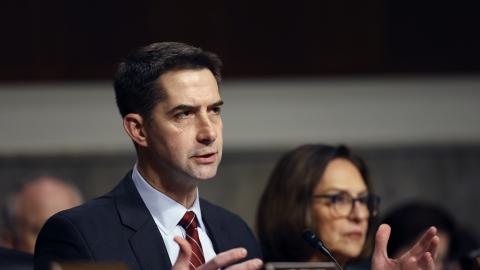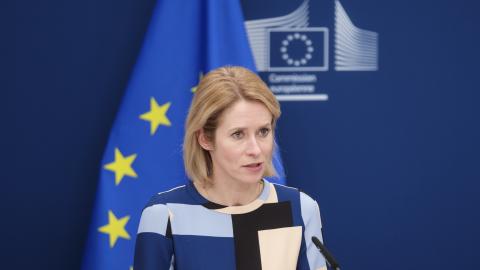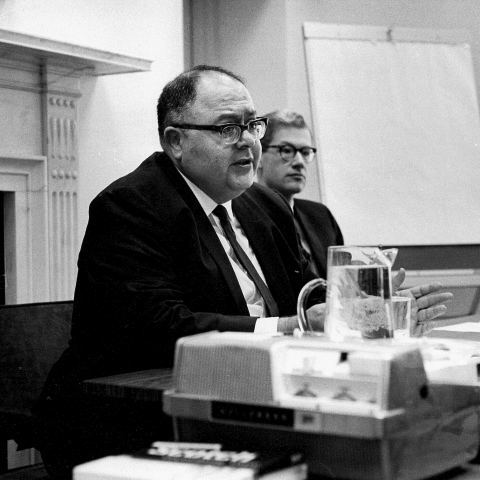The Iran Wars: Spy Games, Bank Battles, and the Secret Deals that Reshaped the Middle East, by Jay Solomon (Random House, 352 pp., $28)
In July 2015, representatives of members of the U.N. Security Council and representatives from Germany and the European Union met in Vienna, to reach an agreement with Iran regarding that country’s nuclear program. The Obama administration and the media were quick to dub the deal they struck “historic,” a term now used to describe anything that has never happened before but otherwise has little to recommend it. The deal called on Iran to halt large portions of its nuclear program for a decade, to reduce the number of centrifuges it has been using to enrich bomb-grade uranium, and to cut down its stockpiles of fissile material. In exchange, the U.S. and the other members of the “P5+1,” as the Vienna group were dubbed, agreed to lift economic sanctions against the Islamic Republic. As Wall Street Journal chief foreign-affairs correspondent Jay Solomon puts it in his new book, the Vienna agreement now stands as “President Obama’s signature foreign-policy achievement” — much as Obamacare stands as his signature domestic-policy achievement.
Obamacare has been a disaster. As Solomon concludes in his fast-paced, well-researched account, the Iran nuclear deal bids fair to be a similar disaster — but one with far more dangerous consequences for the world. Indeed, it may make it impossible for the United States or any other nation to prevent a runaway nuclear-arms race in the Middle East.
Solomon gives us a series of inside glimpses into how this deal came about and why, using interviews with key participants, including the deal’s chief American negotiator, Secretary of State John Kerry. Nonetheless, what emerges is a picture that Obama admirers won’t like. While some have dared to compare the Vienna deal to Nixon’s 1971 opening to China, a better comparison is 1938 Munich. This is because Solomon’s narrative, for all its effort at balance and avoiding alarmist conclusions, is ultimately a tale of how Obama and Kerry threw away the West’s best leverage over a brutal dictatorship, for the sake of a promise from a regime whose word is worthless.
What makes this such a bad deal? If Ronald Reagan’s dictum on arms treaties was to trust but verify, Obama’s is to trust and not even try to verify. As the deal is currently structured, the International Atomic Energy Agency (IAEA), which is supposed to oversee the agreement, has no way of checking on whether Iran is complying unless Tehran gives its consent and is warned months in advance. The deal also comes with an expiration date: After ten years, all restrictions on the Iran nuclear program end. Tehran will be free to start up hundreds of thousands of centrifuges enriching uranium around the clock, if it wishes — a process that could give Iran the bomb it wants within a year, or even sooner. That will certainly set other powers in the region scrambling for nuclear weapons of their own, which, thanks to Pakistan and North Korea, could be only a billion petrodollars away.
A more subtle problem is that the deal sweeps Iran’s past efforts at getting the bomb under the rug. Even “U.S. officials, in private, acknowledged that Tehran would probably never own up to [working on] developing a bomb” in the past, writes Solomon, “nor would it fully cooperate with the [IAEA]’s investigation” in the future. This point is crucial, since “it would be very hard to verify Iran’s compliance with a new nuclear deal if the IAEA . . . didn’t fully understand the scope of Iran’s capabilities.” It’s rather like hiring an ex-con as babysitter without asking whether he did time as a child molester. But “the Obama administration said it could live with this” — and a dozen other giveaways. The reasons lie deep in the pathology of the Obama administration, and in Obama’s mind-set regarding the Middle East.
After all, it’s not as if Obama and Kerry weren’t warned about the potentially disastrous consequences of the agreement they were so single-mindedly pursuing. Foreign-policy experts roundly condemned it — from Henry Kissinger to Olli Heinonen, the former IAEA weapons inspector who told Solomon it sets “an incredibly bad precedent.” Allies in the region from Israel to Saudi Arabia seethed, both publicly and behind the scenes — even as the Saudis and other Sunni powers in the region began to lay plans to acquire nuclear weapons of their own.
Almost from the moment he took office, Obama began pursuing an opening to the mullahs in Tehran — a pursuit that for a long while went unrequited. He sent no fewer than four secret letters to Iran’s “supreme leader,” Ayatollah Khamenei, offering to restart Washington–Tehran relations (which had been largely frozen since the seizure of the U.S. embassy in 1979) and promising to abandon any policy of regime change in Iran. That last promise led to Obama’s complete inaction when young Iranians took to the streets in 2011 in the aftermath of the Arab Spring and his saying nothing when they were being mowed down by Khamenei’s thugs.
Why? By Solomon’s account, Obama “viewed détente with Shiite-dominant Iran as crucial to stopping the spread of nuclear weapons, calming the region, and underpinning efforts to counter radical Sunni groups such as the Islamic State and al-Qaeda.” Whereas previous administrations had treated the terrorist-sponsoring, nuclear-weapon-seeking Iran as the No. 1 pariah of the Middle East, Obama didn’t mind when his decision to enter into direct talks with Iran in 2012 “significantly hurt relations with Israel, Saudi Arabia, and the other Persian Gulf states.”
This turned America’s relations with the Middle East inside out. Our former allies were to be ignored or marginalized; our former enemies were to be courted and cosseted.
The desire to appease Iran led to some of the administration’s most fateful decisions, such as pulling the last American troops out of Iraq (thus inadvertently leading to the rise of ISIS) and refusing to enforce the “red line” in Syria for fear it would upset Assad’s ally, Iran, which opened the door to the current refugee crisis sweeping Europe. Finally, it led to the brokering of the current nuclear deal, which gives Iran practically anything it wants in exchange for its promise not to do again what it still insists it never did in the first place, i.e., try to build an atomic bomb.
There are many dupes and villains in Solomon’s sobering story, but also some heroes. One is lawyer Steven Perles, who, together with the Treasury Department’s Stuart Levey and Robert Morgenthau, crafted the economic sanctions against Iran into a genuinely effective weapon that ultimately forced Tehran to the bargaining table.
Another is Senator Tom Cotton of Arkansas, the Iraq War veteran who sent a letter also signed by 46 other GOP senators directly to the Ayatollah Khamenei, warning him that under the U.S. Constitution the White House did not have the authority to deliver a lasting nuclear deal unless the Senate approved it. According to Solomon’s account, the letter sent shock waves through the administration, with Kerry telling his Iranian negotiating partner that Cotton was “dangerous” and saying the Iranians shouldn’t be distracted by what Cotton or the rest of the Senate might think — Constitution or no Constitution.
Still another hero, not mentioned by Solomon, is Representative Mike Pompeo of Kansas. It was Pompeo who discovered that, as part of the unfreezing of Iranian assets, the White House was paying $1.7 billion to Tehran as settlement of a $400 million claim for U.S. arms sales going back to the shah — or, more precisely, $400 million plus $1.3 billion “interest” for a 35-year-old contract with a ruler the current regime despises and overthrew. The administration was doing this, Pompeo realized, just about the time that Tehran was announcing the release of Americans who had been held hostage in Iran for years. In a letter to Secretary Kerry, Pompeo demanded to know whether the payment was in effect a ransom. A Kerry underling brushed the suggestion aside, but the news that the payment was eventually made in secret bundles of foreign cash seems to prove that Pompeo was right and that the State Department was lying.
Come January, Pompeo will be taking over the CIA, and Senator Cotton too will play an important role in guiding the new Trump administration toward a more muscular approach to dealing with the Iranian threat to the region. Jay Solomon may be correct in concluding that if Tehran decides to abide by the terms of the agreement, this could mark a positive turn for U.S.–Iranian relations and the prospects of peace in the Middle East. But that’s a very large “if.” We’ve seen that the deal has encouraged Tehran to be even more provocative, as its seizure of nine U.S. sailors in the Straits of Hormuz and its encouraging its Houthi allies to fire missiles at U.S. warships off the coast of Yemen demonstrate. Combine this with the war in Syria, Emile Hokayem of London’s International Institute for Strategic Studies tells our author, and “this is the most dangerous time in the Middle East in decades. A fuse has been lit.”
Secretary Kerry told Solomon, about the Vienna deal, that “I have no doubt we avoided a war. None.” No war on his watch, perhaps. But he, and President Obama’s misguided policy, may have set the detonator for a truly terrible one in the future — one that ends in a mushroom cloud.











